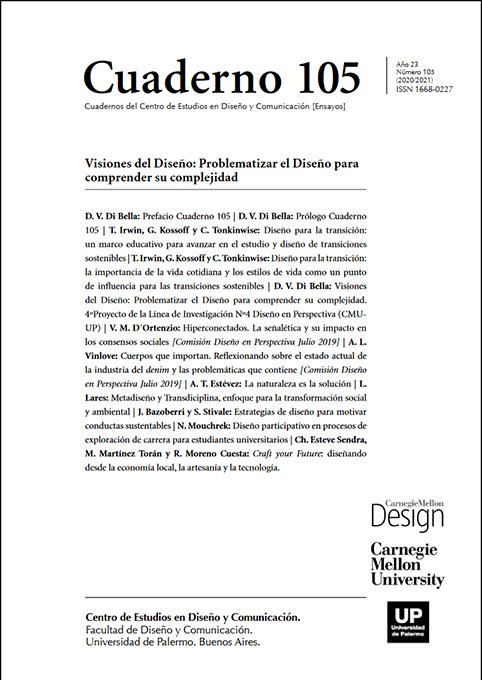Transition Design: The Importance of Everyday Life and Lifestyles as a Leverage Point for Sustainability Transitions
Abstract
The core challenge of the current era is the transition towards sustainability. This transition needs to be defined in the broadest terms possible. It is a project that is at once political, social, economic, cultural, scientific and technological: every dimension of human affairs is challenged by the need for transition, and, as various issues reach critical points (climate change, inequity, resource depletion, biodiversity loss, etc) the urgency with which this needs to happen increases. The School of Design at Carnegie Mellon University have responded to this challenge by introducing what they have called ‘transition design’ into the curricula at the undergraduate, graduate and doctoral levels (Irwin 2015) which “takes as its central premise the need for societal transitions to more sustainable futures and argues that design has a key role to play in these transitions” (Irwin et al. 2015b: 1).
References
Bourdieu, P. (1997). Outline of a Theory of Practice. Cambridge: Cambridge University Press.
Buber, M. (1996). Paths in Utopia. New York (NY): First Syracuse University Press.
Capra, F. & Luisi, P. (2014). The Systems View of Life: A Unifying Vision. Padstow (UK): Cambridge University Press.
Cohen, N. & Ilieva, R. T. (2015). Transitioning the Food System: A strategic practice management approach for cities. Environmental Innovations and Societal Transitions. Available online [accessed 8.4.15] http://www.sciencedirect.com/science/article/pii/S2210422415000052
Debord, G. (2002). Perspectives for Conscious Alteration in Everyday Life. In: Highmore, Ben. The Everyday Life Reader. London (UK): Routledge.
Gardiner, M. E. (2000). Critiques of Everyday Life. London (UK): Routledge.
Geels and Schot. (2010). The Dynamics of Transitions: A Socio-Technical Perspective. In: Grin, John, Rotmans, Jan and Schot, Johan. Transitions to Sustainable Development. London (UK): Routledge.
Giddens, A. (1984). The Constitution of Society. Cambridge: Polity Press
Grin, J. (2010). Understanding Transitions from a Governance Perspective. In: Grin, John, Rotmans, Jan and Schot, Johan. Transitions to Sustainable Development. London (UK): Routledge.
Grin, J.; Rotmans, J. and Schot, J. (2010). Conclusion: How to Understand Transitions? How to Influence Them? Synthesis and Lessons for Further Research. In: Grin, John, Rotmans, Jan and Schot, Johan. Transitions to Sustainable Development. London (UK): Routledge.
Hargreaves, T.; Longhurst, N. and Seyfang, G. (2012). Understanding Sustainability Innovations: Points of Intersection Between the Multi-Level and Social Theory. UEA Norwich, Science, Society and Sustainability (3S) Research Group
Irwin, T.; Tonkinwise,C. and Kossoff, G. (2015a), Transition Design: an educational framework for advancing the study and design of Sustainable Transitions, 6th IST Conference, University of Sussex, Brighton.
Irwin, T. (2015). Redesigning a Design Program: How Carnegie Mellon University is Developing a Design Curricula for the 21st Century, Solutions Journal. Available online [accessed 07.01.15] http://www.thesolutionsjournal.com/node/2372962015
Irwin, T.; Kossoff, G.; Tonkinwise, C. and Scuppelli, P. (2015b). Transition Design Overview. Carnegie Mellon School of Design, Pittsburgh. Available online [accessed 07.01.15] https://www.academia.edu/13122242/Transition_Design_Overview
Kuijer, L.; De Jong, A. and Van Eijk, D. (2013). ACM Transactions on Computer-Human Interaction, 20: 4. New York: ACM Inc.
Koestler, A. (1975). The Ghost in the Machine. London (UK): Pan Books.
Kossoff, G. (2011a). Holism and the Reconstitution of Everyday Life: A Framework for Transition to a Sustainable Society. Ph.D. diss., University of Dundee, Scotland.
Kossoff, G. (2011b). Holism and the Reconstitution of Everyday Life: A Framework for Transition to a Sustainable Society. In: Harding, Stephan, ed. Grow Small, Think Beautiful. Edinburgh (UK): Floris Books.
Lefebvre, H. (2008). Critique of Everyday Life, vol. 1. London (UK): Verso.
Marshall, P. (2010). Demanding the Impossible: A History of Anarchism. Oakland (CA): PM Press.
Strengers, Y. and Maller, C. (2011). Integrating Health, Housing and Energy Policies: Social Practices of Cooling. In: Building Research and Information 39 (2)154-168. London (UK): Routledge.
Max-Neef, M. A. et al. (1992). Human Scale Development: Conception, Application and Further Reflections. New York (NY): Apex. Available online [accessed 8.1.15] http://www.area-net.org/fileadmin/user_upload/papers/Max-neef_Human_Scale_development.pdf
Mumford, L. (1961). The City in History: Its Origins, Its Transformations and its Prospects. London: Secker and Warburg.
Robertson, B. J. (2015). Holocracy: The New Management Systems for a Rapidly Changing World. New York (NY): Henry Holt and Company, LLC.
Rotmans, J. and Loorbach, D. (2010). Toward a Better Understanding of Transitions and Their Governance: A Systemic and Reflexive Approach. In: Grin, John, Rotmans, Jan and Schot, Johan. Transitions to Sustainable Development. London (UK): Routledge.
Sahakian, M. and Wilhite, H. (2014). Making Practice Theory Practicable: Towards More Sustainable Forms of Consumption. In: Journal of Consumer Culture 14: 25. Thousand Oaks (CA): Sage.
Scott, J. C. (1999). Seeing Like a State: How Certain Schemes to Improve the Human Condition Have Failed. New Haven (CT): Yale University Press.
Seyfang, G. (2010). Community Action for Sustainable Housing: Building a low-carbon future. Energy Policy. 38: 7624-7633.
Schatzki, T. (2010). Timespace and Human Activity: On Performance, Society, and History as Indeterminate Teleological Events. Latham, MD: Lexington Books.
Sheringham, M. (2009). Everyday Life: Theories and Practices from Surrealism to the Present. Oxford (UK): Oxford University Press.
Shove, E.; Pantzar, M. & Watson, M. (2012). The Dynamics of Social Practice: Everyday LIfe and How it Changes. London (UK): Sage Publications.
Shove, E. & Walker, G. (2010). Governing Transitions in the Sustainability of Everyday Life. Research Policy. 39: 471-476.
Smith, D. (1987). The Everyday World as Problematic: A Feminist Sociology. Boston: Northeastern University Press.
Strengers, Y. (2010). Conceptualising Everyday Practices: Composition, Reproduction and Change. Centre for Design, Melbourne, RMIT University and University of South Australia.
White, D. & Kossoff, G. (2007). Anarchism, Libertarianism and Environmentalism: AntiAuthoritarian Thought and the Search for Self-Organizing Societies.The SAGE Handbook of Environment and Society. London (UK): Sage Publications. pp. 50-64.
Wilber, K. (2011). A Theory of Everything: An Integral Vision for Business, Politics, Science, and Spirituality. Boston (MA): Shambhala Publications Inc.
Los autores/as que publiquen en esta revista ceden los derechos de autor y de publicación a "Cuadernos del Centro de Estudios de Diseño y Comunicación", Aceptando el registro de su trabajo bajo una licencia de atribución de Creative Commons, que permite a terceros utilizar lo publicado siempre que de el crédito pertinente a los autores y a esta revista.


